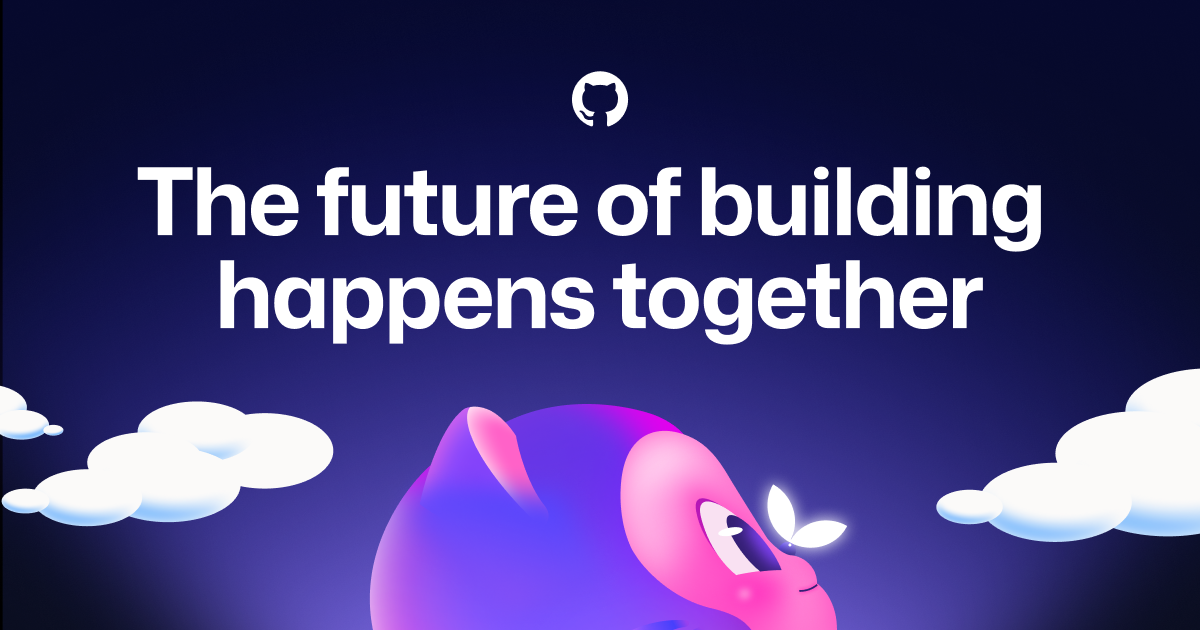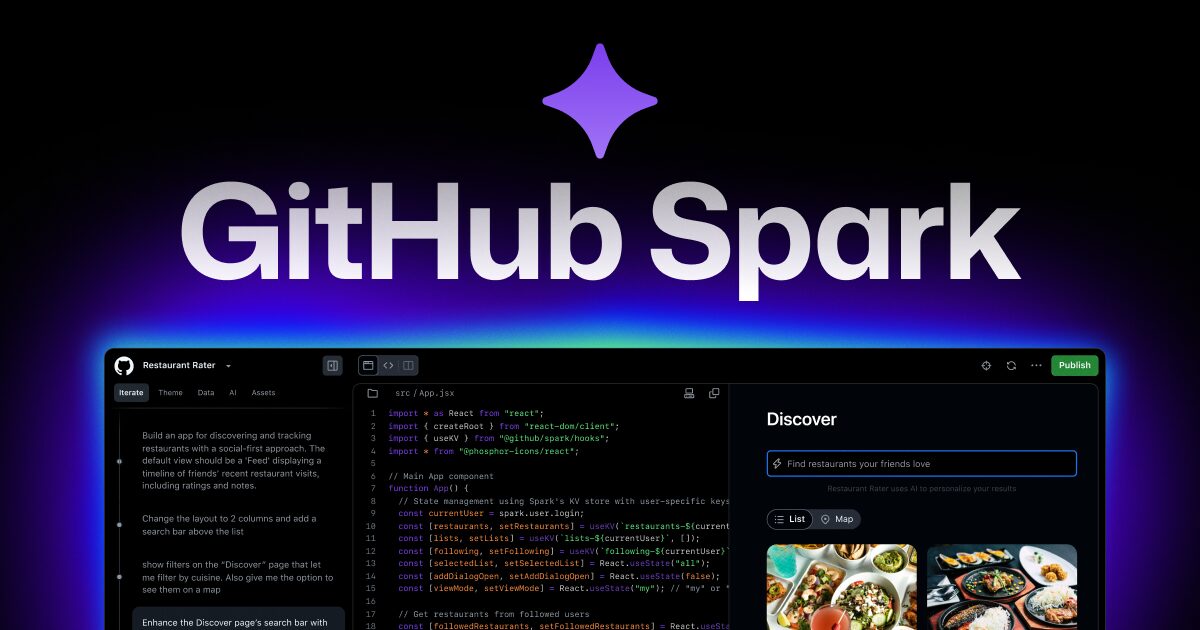
Table of Contents
Overview
In the fast-paced world of AI development, getting an idea from concept to a functional application can often be a complex and time-consuming process. Enter GitHub Spark, a revolutionary tool designed to accelerate this journey by transforming your innovative ideas into full-stack intelligent applications, ready for publication with a single click. It’s an exciting new offering aimed at streamlining the development workflow, especially for AI-powered projects.
Key Features
GitHub Spark comes packed with features designed to simplify and speed up your development process. Here’s a closer look at what it offers:
- AI-assisted code generation: Leverage artificial intelligence to automatically generate significant portions of your application’s code, reducing manual effort and accelerating development cycles.
- Full-stack project scaffolding: Get a complete TypeScript and React frontend with integrated backend structure generated for your project, ensuring a solid foundation for modern web applications.
- Built-in hosting and deployment: No need to configure external hosting integrated solutions for deploying your applications with automatic scaling and GitHub authentication.
- Integration with GitHub ecosystem: Seamlessly connect with your existing GitHub repositories, making version control, collaboration, and CI/CD integration effortless.
- One-click publish: Deploy your application to the web with a single click, drastically cutting down on publishing time while maintaining production-ready standards.
- Real-time previews: See your changes and application in action instantly, allowing for rapid iteration and immediate feedback during development.
How It Works
Getting started with GitHub Spark is remarkably straightforward, designed to take you from a high-level concept to a deployed application with minimal friction. Users simply begin by articulating their app idea or concept in natural language. GitHub Spark then intelligently generates the necessary TypeScript and React frontend code along with backend boilerplate, providing a ready-to-build foundation. From there, the application can be previewed in real-time, edited directly within the environment using GitHub Codespaces integration, and deployed instantly to Spark’s managed runtime. The entire development and deployment lifecycle is seamlessly managed through your GitHub account, ensuring a cohesive and integrated experience with full access to GitHub’s ecosystem of tools and services.
Use Cases
GitHub Spark is an incredibly versatile tool, perfect for a variety of development scenarios where speed and efficiency are paramount. Here are some key use cases where it truly shines:
- Rapid app prototyping: Quickly bring app ideas to life to test concepts and gather early feedback without extensive development time or infrastructure setup.
- Developer learning and experimentation: A fantastic platform for developers to learn new technologies, experiment with AI concepts, or explore TypeScript and React in a low-setup environment.
- Hackathons and product demos: Build impressive, functional applications in a short timeframe, ideal for competitive events, startup pitches, or showcasing product potential to stakeholders.
- Building AI-enabled tools: Specifically designed to facilitate the creation of applications that leverage artificial intelligence capabilities with built-in model access and smart features.
Pros \& Cons
Like any innovative tool, GitHub Spark offers distinct advantages while also having areas that are still evolving.
Advantages
- Fast development cycle: Significantly reduces the time from idea to deployment, accelerating project timelines and enabling rapid iteration.
- Seamless GitHub integration: Leverages the power and familiarity of GitHub for version control, collaboration, project management, and access to the broader developer ecosystem.
- Minimal setup needed: Get started quickly without complex configurations, dependency management, or extensive environment setup.
- Enterprise-grade infrastructure: Built on GitHub’s trusted platform with automatic scaling, security, and reliability features included.
- Code ownership: Full access to generated source code with the ability to export to standard GitHub repositories for continued development.
Disadvantages
- Public preview status: As a newer tool currently in public preview, it may experience occasional bugs, feature changes, or evolving capabilities.
- Framework limitations: Currently focused on TypeScript and React applications, which may not suit all project requirements or technology preferences.
- Usage quotas: Subscription-based message limits may constrain teams with heavy usage patterns or large-scale development needs.
- Customization boundaries: While excellent for rapid prototyping and standard applications, complex enterprise requirements may need additional development work.
How Does It Compare?
When evaluating GitHub Spark against other tools in the AI development ecosystem, its unique blend of features and deep GitHub integration becomes apparent.
Compared to Vercel AI SDK, GitHub Spark offers a fundamentally different approach to AI application development. While Vercel AI SDK provides excellent tools for building AI-powered applications with comprehensive model support, AI Gateway for unified access, and advanced features like client-side tool execution, it operates more as a development framework requiring traditional coding approaches. GitHub Spark, by contrast, focuses on natural language-to-application generation with integrated hosting and deployment, making it more accessible to non-traditional developers while Vercel AI SDK offers greater flexibility for experienced developers building complex AI workflows.
Against Claude Artifacts, GitHub Spark provides a more comprehensive development environment. While Claude Artifacts excels at creating shareable, interactive applications directly within the Claude interface and offers impressive AI-powered app generation capabilities, it operates within Anthropic’s ecosystem with certain limitations around external integrations and persistence. GitHub Spark’s advantage lies in its deep integration with the entire GitHub platform, standard code repository generation, and professional development workflow support, making it better suited for applications that need to scale beyond prototyping into production environments.
When compared to Replit, the platforms serve different but sometimes overlapping needs. Replit offers a powerful browser-based IDE with broad language support, collaborative features, and its own AI assistant (Ghostwriter). However, recent incidents involving Replit’s AI agents have raised concerns about safety and reliability in production environments. GitHub Spark’s more constrained, developer-in-the-loop approach prioritizes safety and human oversight, while Replit provides more flexibility for experienced developers who can manage the associated risks. Additionally, GitHub Spark’s exclusive focus on the GitHub ecosystem provides tighter integration for teams already invested in GitHub workflows.
Lovable represents another interesting comparison point, focusing heavily on natural language-to-app generation with strong GitHub integration and full-stack code generation. While both platforms share similar goals of democratizing app development, GitHub Spark benefits from Microsoft’s backing and deep integration with the broader GitHub ecosystem, potentially offering more long-term stability and enterprise features as the platform matures.
Final Thoughts
GitHub Spark represents a compelling leap forward for developers looking to quickly build and deploy AI-powered applications within the trusted GitHub ecosystem. Its focus on AI-assisted code generation, full-stack scaffolding, and seamless GitHub integration makes it an incredibly powerful tool for rapid prototyping, learning, and accelerating development workflows. While currently in public preview with some limitations around framework choices and usage quotas, its potential to democratize and accelerate AI app development is substantial. The platform’s emphasis on code ownership, professional development workflows, and safety-first AI assistance positions it uniquely in the market. For teams already invested in the GitHub ecosystem and anyone looking to transform ideas into intelligent applications with unprecedented speed and reliability, GitHub Spark offers a promising path forward that balances accessibility with professional development standards.

